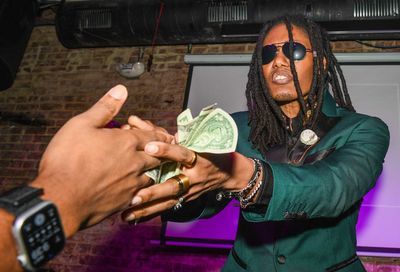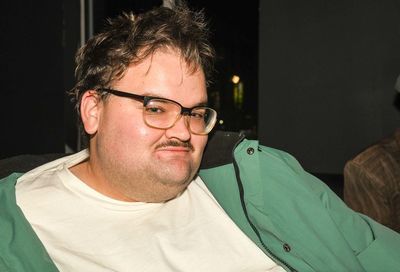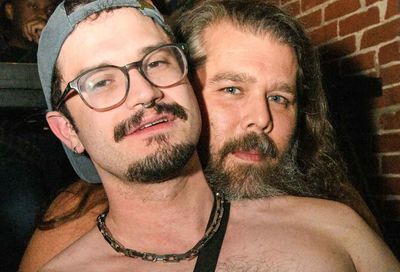Game Plan
Now that NBA baskeball player John Amaechi is out in public, what's the next step?
Something different happens when a professional athlete steps out of the closet and into the public eye. Entertainers, lawyers, even politicians — their stories can be difficult and dramatic and necessary, but they are in many ways familiar to a GLBT community that continues to fight for acceptance.
But sports is something different.
So when former NBA basketball player John Amaechi told his story, people listened who might otherwise have turned a deaf ear.
 John Amaechi |
With the publication of his memoir, Man in the Middle, and the ensuing media frenzy, Amaechi joined the still-small group of out, gay and former pro athletes who made a career in the basketball courts, playing fields and locker rooms where homophobia — overt and covert — still reigns.
While there was some reaction to Amaechi’s story in that vein — former NBA player Tim Hardaway bluntly stated his hatred for homosexuals on a sports talk show — the overall response was publicly positive.
With his basketball career behind him, the one-time ”freakish” 17-year-old British teen has moved on to a career as a consulting psychologist. Since his public coming out, he has signed on as a spokesperson for the Human Rights Campaign and traveled the country for speaking engagements large and small.
He’s a keynote speaker for the 2007 Youth Pride Day on Saturday, April 28. Working with youth is a passion of his, from his anti-bullying work to his establishment of a youth basketball program in England. It’s a passion sure to be on display every time he takes the stage.
METRO WEEKLY: There was a lot of media attention to your story when you first came out in the press. Now that it’s died down a bit, how are you adjusting to this newly public position?
JOHN AMAECHI: Pretty quickly, I think. I think one of the things that gets lost is that in England I’ve been living openly for three or four years now. It’s not as if eight weeks ago was the first day anyone’s looked at me and knew I was gay. It’s been very pleasant, for the most part. And when it’s not pleasant, it’s edifying.
MW: Have you noticed a significant difference in how it feels to be out in England and how it feels to be out in America?
AMAECHI: Probably the best way that I can describe it is that when I’m in England I feel like I’m on holiday, and when I’m here I feel like I’m working.
MW: Why do you think that is? Is it because England is home for you?
AMAECHI: Definitely. England is home obviously, but part of it is just that there’s so much more that has to be done here, to get equity where it needs to be.
MW: Do you find American culture to be less accepting then?
AMAECHI: I think what we have is a situation where somehow a decision has been made that homophobia and increasingly other types of [bigotry] are generally acceptable. People often cite [the First Amendment], talking about freedom of speech and freedom of expression, when really what they want is a license to be a bigot. I’m not a constitutional scholar, but I’m fairly sure that’s not what the framers had in mind.
MW: Regarding Tim Hardaway’s homophobic comments: you seemed very gracious in how you handled the situation. How did you feel when you first heard what he said?
AMAECHI: My initial reaction was I thought it was laughably stupid. I actually laughed, because I didn’t imagine anyone would be so foolish as to say something like that out loud. I don’t think there’s any gay person, black person, or minority of any description who doesn’t realize that there are people out there who hate them. But normally that type of rhetoric is reserved for private gatherings.
MW: Was the reaction of people from within the NBA better or worse than you expected?
AMAECHI: It was about what I expected. One of the important things is [that] a number of people said really lovely things to the media, and I appreciate that. And a lot of the people who have spoken to the media aren’t necessarily my friends, they’re just people I’ve played against or played with.
MW: It’s often generally accepted that someday gay athletes will be out while they are actually professionally playing. Do you feel that this is something that will happen sooner, rather than later?
AMAECHI: No, not particularly.
MW: Why?
AMAECHI: Why would I? I look for affirmative evidence. Where’s the affirmative evidence that suggests that that would be the case? I don’t see any. Sometimes I have to bottom-line it with people, because the rose-colored glasses are a bad thing. We live in a country where school districts vie to get rid of gay teachers. We live in a country where people associate gay people with pedophilia. We live in a country where the government actively discriminates against a portion of its population. So then I would ask you again, where is the positive proof of progress?
MW: Why is athletics different than other professions?
AMAECHI: It isn’t. It’s not a sports issue, it’s a workplace issue.
MW: Let’s say journalism — I work in that field and I work with a gay journalists group. The level of acceptance for gay journalists being out and working on non-gay beats has increased over the past 15 years. I would say that would be positive evidence of how it does work.
AMAECHI: There is a threshold level. You have to imagine that you’re standing in front of a box that’s two feet high, and whilst every year we jump closer and closer towards two feet to the point where our feet will be upon the podium, until you reach two feet, all you have is scraped shins.
Do you imagine that most of the [gay] people who are journalists are out?
MW: No, but I do remember what it was like when I started.
AMAECHI: I’m not disputing the fact that things are better.
MW: That’s what I’m trying to get at.
AMAECHI: There’s no point in pretending that things getting better means anything until it’s a threshold level. It was great when people where nicer to slaves, but things didn’t get better until the law said, ”By the way, we changed our minds and you really are human.” So, yes, it’s better when you go from being beaten to not being beaten. But it’s much better when you stop being a slave.
The threshold has not been reached. There’s no point in pretending it has. I’ve walked through TV studios, ostensibly one of the safest places for gay and lesbian people, and I get asked this same question, and I look around the studio and I just think it’s absurd — the one gay journalist in that room is asking me the question, and there are closeted floor execs and producers wandering around the place. Unless there’s some kind of built-in, unfounded paranoia amongst all gay people, it is not universally safe to be out. Financially, emotionally, psychologically, or in terms of your career advancement.
Advertisement
|
MW: What made you choose to be out then?
AMAECHI: It’s the right thing to do. It was a conversation that needed to be had. I wanted to make it so that people who didn’t normally ever have to address this issue would all of a sudden be confronted with it and have to talk about it.
MW: Are there barriers for young gay people participating in sports — not professionally, just as something that would be a part of their lives?
AMAECHI: Yes. There are barriers because of how sports are taught and how they are coached. It’s not necessarily just that they are this heterosexist bastion, it’s just that there’s an expectation that gay people won’t do sports.
MW: Do gay people buy into those expectations?
AMAECHI: If an impression is given to you that you’re not welcome, then that perforates even the toughest skin.
MW: Do you see benefits for gay youth becoming involved with sports?
AMAECHI: There’s a benefit for all youth becoming involved in sports. Absolutely all youth.
MW: Is the benefit physical, mental or a combination?
AMAECHI: It is a combination of all things. Participation alone raises your heart rate. But participation in an environment where you are cared for and the coaching is directed toward your whole body and mind, that has massive positive ramifications on young people.
MW: What drew you to sports? Was it the physical skill involved, or the competition?
AMAECHI: None of those. I was looked at as a freak for being tall and fat. Then I suddenly found that there was an environment where I was looked at as a commodity.
MW: Did you feel lucky to have found it?
AMAECHI: No. I rarely attribute things to luck. I was given an opportunity — a very brief and fleeting one, actually — when somebody just came up to me on the street and asked me if I wanted to play. I said yes. I took an opportunity.
MW: You have an interesting take on the state of the world and how it’s changing for gays, but how do you see the world changing for young gay people right now?
AMAECHI: I do think that there are more opportunities out there, and there is more acceptance out there. And I do always try to make that clear. But a great deal of complacency can come from the idea that this is a natural evolution, and that change will happen with time. Change doesn’t happen with time, change takes action. That’s really the point I’m trying to make when I talk to young people. It’s not that every young person has to be an activist, but every young person has to have a role. It might be a tiny role — it might just be them coming to terms with themselves and trying to live as full a life as they can for themselves. But we’re not going to get to a point of equality just by waiting. Equal rights for black people in this country still hasn’t happened in its fullest extent, and it’s not going to happen with time. It still takes activists.
MW: People often say that the more people come out, the more it forces people to deal with the issue. You mention being in TV studios with a lot of closeted people — what are your thoughts on people who essentially, past the age of 30 or 40, have lived through a lot of these changes but still haven’t come out?
AMAECHI: People need to have a much more complex view of what coming out is. It’s a process of living openly. The fact is that there are people out there right now in the media spotlight who many people consider have not come out. At the same time, if you were within their friend group, within their family group, they may be out to them. It is not for me to decide that personal journey. I think outing is reprehensible, I think insinuations are reprehensible, with only one caveat. If you are a person who is, say, a [closeted] television weatherman who chooses to slip into your weather broadcast about how gay people are horrible, then I think the door is open.
MW: Is there an increased level of responsibility for people who are famous or have careers that are based on being in public?
AMAECHI: I feel that there is, yet at the same time that does not invalidate this personal journey theory. We can’t have it both ways.
MW: Keith Olbermann laid into Anderson Cooper for saying that he doesn’t want to talk about personal issues, asking why it was then okay for Cooper to write about his family and his brother’s suicide. Do some people pick and choose which aspects of their personal lives the reveal: ”I want to use this part of my personal life for public consumption and for professional reasons, but I don’t want to use these other parts.”
AMAECHI: There’s a logic to what Olbermann says, and I have to say I really enjoy Olbermann as a journalist. Yet at the same time, how many people get fired because their parent dies of cancer? Whereas saying you’re gay can get you fired in 33 states. I’m not saying that’s what would happen to Anderson Cooper, but if he is a gay person, then his fear is not unfounded. It will have an effect.
MW: As a gay man, what type of discrimination have you experienced?
AMAECHI: I’m in a different space than most people, because most bigots are cowards, and I’m 350 pounds and 6’9”. So most of the attacks that I receive come in e-mail.
MW: With everything that’s happened with your public coming out, do you ever wish you’d done it earlier?
AMAECHI: I wish I’d been in a position to do it earlier, yes. That would have been good.
MW: To turn back to an earlier topic, sometimes in all the discussion about professional athletes coming out, we forget about open, lesbian players in tennis. But for men, is something like tennis or golf going to be an easier sport for people to deal with the idea?
AMAECHI: No. It hasn’t so far. We say, look how good women’s tennis has been, because you’ve got Martina Navratilova and Amelie Mauresmo. Who else do we have?
MW: I can think of three or four.
AMAECHI: We’ve got four over how many decades? You think about that and the number of people who have cycled through tennis, and you just realize that it’s a tiny, tiny percentage. It’s not even close to the number we should be talking about.
MW: But do you think that it’s a sign that it may change faster than you think?
AMAECHI: No, society can be really stupid. It’s a sign that we expect women in sport to be lesbians. As absurd as it is, people still expect that in this day and age. We live in a society where straight men who throw Leviticus at gay men are the same ones who have no problem putting dollars in the g-strings of two women kissing. So, it’s a complete double standard, but it doesn’t illustrate tolerance, it just illustrates the fact that straight men don’t mind the idea of lesbians. Which I think is really demeaning to women on so many levels.
MW: Does the gay and lesbian community face separate challenges for the men and the women?
AMAECHI: No, equal challenges. One of the most absurd things I hear is, ”Is it easier for women to come out than for men?” Which demeans their personal journey in such a massive way. They have the same worries about economics and labeling and stereotyping, they have the same emotional and psychological difficulties. Maybe gay men and the GLBT community as a whole needs to recognize that more clearly.
MW: What’s the one main thing that you want young gay people to hear from you?
AMAECHI: I don’t know if there is a one main thing. I would hope that young gay people would realize that the story that I am trying to tell through my book and through myself is not just one about being gay. It’s about the place of being gay in my life, and the troubles and convoluted feelings that I have in common with many of them, if not all of them. But the fact is that a fat, freakish, 17-year-old kid who hid in the corner of the library and tried to walk through the halls of his school being invisible could achieve something pretty cool. The idea that the most unlikely people in the most improbable situations can achieve extraordinary things, that’s what I want for them.
MW: Is that 17-year-old still somewhere inside you?
AMAECHI: Oh, God yeah. There are certain scars from childhood that never leave. I’ve been a professional athlete and been in pretty good shape, and I still have an abominable body image. I will never ever be seen with my shirt off in public, to this day. Even when I was in the [NBA], and I knew I was in shape, when we went to Miami I still was on the beach in a T-shirt, because those comments and remarks from my childhood stick with me. It’s almost impossible to just forget those things that haunted you as a child. But it is possible to move past them, and I think that I’m a living testament to that, too.
John Amaechi will speak at the 11th Annual Youth Pride Day, Saturday, April 28, held noon to 5 p.m. in Rock Creek Park at the corner of 23rd and P Streets NW. For more information on Youth Pride, see the Official Youth Pride Guide.
Support Metro Weekly’s Journalism
These are challenging times for news organizations. And yet it’s crucial we stay active and provide vital resources and information to both our local readers and the world. So won’t you please take a moment and consider supporting Metro Weekly with a membership? For as little as $5 a month, you can help ensure Metro Weekly magazine and MetroWeekly.com remain free, viable resources as we provide the best, most diverse, culturally-resonant LGBTQ coverage in both the D.C. region and around the world. Memberships come with exclusive perks and discounts, your own personal digital delivery of each week’s magazine (and an archive), access to our Member's Lounge when it launches this fall, and exclusive members-only items like Metro Weekly Membership Mugs and Tote Bags! Check out all our membership levels here and please join us today!
























